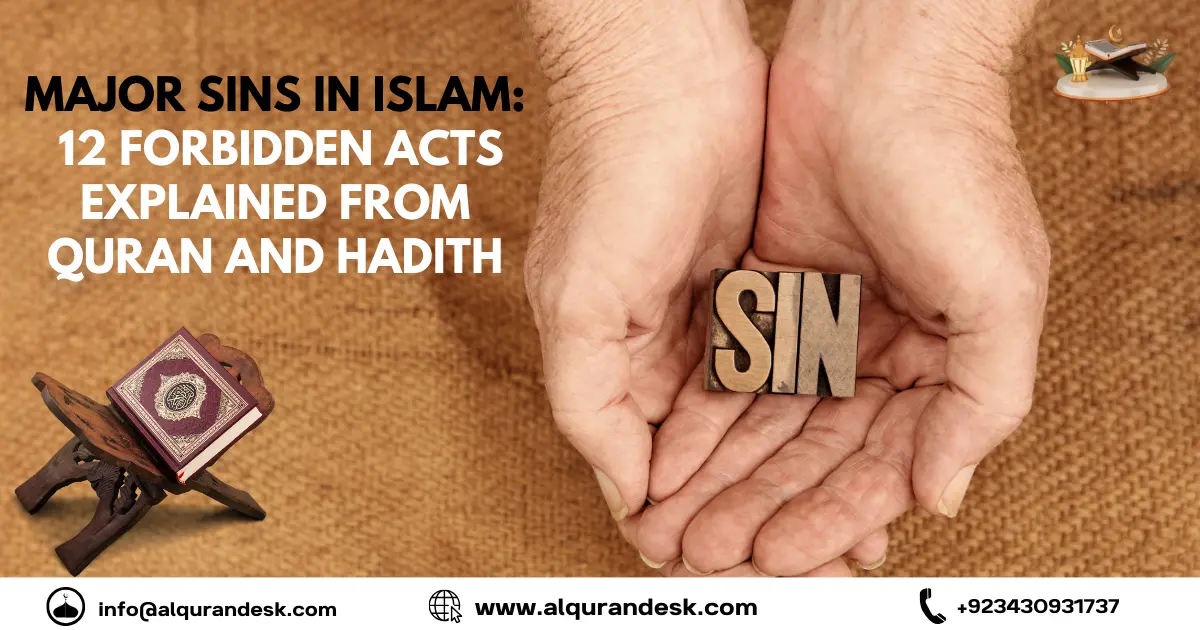
12 Major Sins in Islam (Gunah e Kabira List) from the Quran and Hadith
Introduction
Major Sins in Islam (Al-Kabāʾir) are those acts that Allah ﷻ and His Messenger ﷺ have strongly forbidden, and which bring severe punishment in the Hereafter unless one sincerely repents. Sins in Islam can be categorised into two, which are the sins of Gunah e Kabira (Major Sins) and Gunah e Saghira (Minor Sins). Allah has explicitly cautioned the believers about the gravity of committing major sins, known as Al-Kabāʾir in Islam, which lead to dire consequences in both the present world and the Hereafter unless one changes his/her heart Accordingly, this blog examines the 12 Major Sins in Islam (Gunah e Kabira List) mentioned in the Quran and Hadith, their punishment and the significance of repenting. We shall also give some steps on how to avoid sins, as well as the distinction between Gunah e Kabira and Gunah e Saghira. Allah ﷻ says in the Qur’an:
“If you avoid the major sins which you are forbidden, We will remove from you your minor sins and admit you to a noble entrance [into Paradise].”
(Surah An-Nisa, 4:31)
On this page, we will see a discussion of 12 Major Sins in Islam, their Quranic and Hadith evidence, their punishments, the concept of Tawbah (reconciliation/repentance) and genuine supplications (duas).
As a new Muslim and someone wanting to have a new authentic guidance, consider the foundational learning of the New Muslim Course Online with Converts at AlQuranDesk.
Categories of Sins in Islam
As a new Muslim and someone wanting to have a new authentic guidance, consider the foundational learning of the New Muslim Course Online with Converts at AlQuranDesk.
Sagha-ir (Minor sins)-Sins overlooked by Salah, fasting, Dhikr and consistent good deeds.
Gunah e Kabira (Major sins)-sins that need repentance, regret and future avoidance.
The Prophet ﷺ said:
“The five daily prayers, and one Jumu’ah to the next Jumu’ah, and one Ramadan to the next Ramadan, are expiations for whatever (sins) come in between them, so long as one avoids major sins.”
(Sahih Muslim, Hadith 233)
What are Gunah e Kabira (Major Sins)?
Gunah e Kabira means sins against which Allah has prescribed.
The Quran’s penalty is harsh punishment
There would be a stern warning by the Prophet in an authentic Hadith
A definite Hadd punishment in Shari A Hadd punishment is an act or deed that is punishable in the Sharia. A Hadd is a punishment: Acts punishable by a Hadd. It is a literal translation of the word Hadd. For example, if one cuts through a grassland, this is a Hadd punishment
Examples would be shirk (association of partners with Allah), murder, adultery, theft and eating interest.
What are Gunah e Saghira (Minor Sins)?
Gunah e Saghira, are lesser sins for which Allah has not fixed a Hadd penalty. These are things like foul language, time waste and envy or minor lapses in everyday life. But in case one continues such minor sins without repentance, they can turn out to be major sins.
Difference Between Gunah e Kabira and Gunah e Saghira
|
Aspect |
Gunah e Kabira (Major Sins) |
Gunah e Saghira (Minor Sins) |
|
Definition |
Grave sins mentioned in the Qur’an & Hadith with severe punishments |
Lesser sins are not explicitly assigned a severe punishment |
|
Examples |
Shirk, murder, zina, theft, interest, false testimony, Backbiting, |
jealousy, wasting time. |
|
Punishment |
Hadd (fixed punishment), curse of Allah, Jahannam warning |
Forgiven through good deeds, Salah, fasting, or dhikr |
|
Repentance |
Requires Taubah Nasooha (sincere repentance) |
Forgiven by daily worship & Istighfar |
|
Effect if repeated |
Leads to Jahannam unless repented |
Can turn into major sins if ignored repeatedly |
The 12 Major Gunah e Kabira Sins in Islam
1. Shirk (Connecting Partners with Allah)
Reference:
Allah says:
“Indeed, Allah does not forgive associating others with Him, but He forgives anything else for whom He wills.”
(Surah An-Nisa, 4:48)
Punishment: Eternal Hellfire if one dies without repenting.
Repentance: Believing in Tawheed and uttering Shahadah and avoiding any of the acts of shirk.
2. Murder (Unjust Killing of a Soul)
Reference:
“Whoever kills a soul unless for a soul or corruption [done] in the land – it is as if he had slain mankind entirely.”
(Surah Al-Ma’idah, 5:32)
Punishment: Strict punishment in Hell in the event of non-forgiveness.
Tawbah: Genuine repentance, for forgiveness and making up for losses to heirs, where possible.
3. Abandoning Salah (Ignoring Prayer)
Hadith:
The Prophet ﷺ said:
“Between a man and shirk and kufr is abandoning the prayer.”
(Sahih Muslim, Hadith 82)
Punishment: On the Day of Judgment, prayer will be the first deed questioned.
Tawbah: Urgent returning to the usual performances of Salah but with Khushu (humility).

4. Disobedience to Parents
Reference:
The Prophet ﷺ said:
“Shall I not tell you of the greatest of major sins?” They said: Yes, O Messenger of Allah. He said: Associating others with Allah and disobedience to parents.”
(Sahih al-Bukhari 2654, Muslim 87)
Punishment: Denied blessings and severe accountability.
Tawbah: Abstinence from dealing with interest.
5.Consuming Riba (Usury/Interest)
Reference:
“Those who consume interest cannot stand [on the Day of Resurrection] except as one stands who is being beaten by Satan into madness.”
(Surah Al-Baqarah, 2:275)
Punishment: War declared by Allah and His Messenger ﷺ.
Tawbah: Stopping all interest dealings immediately.
6. Zina (Fornication and Adultery)
Reference:
“Do not approach unlawful sexual intercourse. Indeed, it is ever an immorality and is evil as a way.”
(Surah Al-Isra, 17:32)
Punishment: In Shariah law, lashes for the unmarried, stoning for the married (with conditions).
Tawbah: Lowering the gaze, fasting, and protection by marriage.
7. Consuming Alcohol and Intoxicants
Hadith:
The Prophet ﷺ said:
“Whatever intoxicates in large quantity, a small amount of it is also haram.”
(Sunan Ibn Majah 3392)
Punishment: Cursed by Allah.
Tawbah: Complete abstinence and replacing with Halal activities.
8. Stealing
Hadith:
“The hand should be cut off for stealing something worth a quarter of a Dinar or more.”
(Sahih al-Bukhari 6789, Muslim 1684)
Punishment: Harsh responsibility and disgrace.
Tawbah: Restitution of stolen property, repentance.
9. Bribery (Rishwa)
Hadith:
“The Messenger of Allah ﷺ cursed the one who gives a bribe and the one who takes it.”
(Sunan Abi Dawood 3580)
Punishment: Cursed by Allah and deprived of justice.
Tawbah: Stop bribery, seek forgiveness, and reform.
10.Breaking the Fast of Ramadan without Excuse
Hadith:
“Whoever breaks one fast of Ramadan without excuse or illness, then even if he fasted for a lifetime, it would not make up for it.”
(Sunan Abu Dawood 2396)
Punishment: Severe sin.
Tawbah: Repentance, Qadha fast, extra nafl fasting.
11. Backbiting and Slander (Gheebah and Buhtan)
Reference:
“And do not backbite one another. Would one of you like to eat the flesh of his brother when dead? You would detest it.”
(Surah Al-Hujurat, 49:12)
Punishment: Deeds consumed on Day of Judgment.
Tawbah: Stop gossip, seek forgiveness from Allah and the wronged person.
12. False Oath & Lying about Allah’s Religion
Hadith:
The Prophet ﷺ said:
“False testimony is among the greatest of sins.”
(Sahih al-Bukhari 2654, Muslim 87)
Punishment: Severe punishment in Hell.
Tawbah: Speaking only truth and repenting.
Punishments for Major Sins
- Shirk: Eternal Hellfire
- Murder: Retaliation or Hellfire
- Zina: Stoning / lashes
- Riba: War from Allah
- Disobedience to parents: Loss of barakah
- Alcohol: Curse & whip punishment
Concerns of Major Sins in Islam:
Islam warns people against the committal of major sins and also the drastic reasons for their consequences, both in this life and in the Hereafter. Major sins, when left unrepentant of, are a source of spiritual darkness in the soul, a decrease in faith and a loss of blessings of Allah. Prophet PBUH said that when a believer does something wrong, a black spot is put on his heart, and by continuing to sin and neglecting repentance, the heart becomes insensitive (Musnad Ahmad, Tirmidhi). In the Hereafter, major sins that have not been repented, may attract serious punishments, humiliations and alienating oneself to the mercy of Allah. Other sins cannot be forgiven without sincere repentance as stated in the Quran: i.e. Shirk – i.e. that a person finds a partner to worship or associate to Allah, which the Quran condemned this act as known: (Surah An-Nisa 4:48) and thereafter proffered such less subject to forgiveness by Allah: (Surah An-Nisa 4:48). The other types of sin committed, such as the theft, murder, and false witness, are punished heavily as well.
But Allah reminds us that his mercy is even more important than his wrath. Even the one who committed mortal sin may be forgiven by repenting sincerely, leaving his/her ways of sin and walking in the ways of good. And it is not to lapse into desperation since self-knowledge of the impact of sins upon the third party is only supposed to make believers even more inclined to seek forgiveness of Allah and thus live in the awareness of their actions and words.
Concept of Tawbah (Repentance) in Islam
Allah ﷻ says:
“And turn to Allah in repentance, all of you, O believers, that you might succeed.”
(Surah An-Nur, 24:31)
Conditions of Tawbah:
- Stop committing the sin.
- Feel regret and remorse.
- Make a firm intention not to return.
- If related to others’ rights, restore them.
The prayer of repentance (Salat al-Tawbah)
- Pray sincerely two rakhs.
- Protective verses are Al-Ikhlas, Al-Falaq, and An-Nas.
Practical Steps to Avoid Gunah e Kabira Sins
Major sin (Kabirah) is a serious issue in the view of Islam, yet Allah has also revealed to us the way of repentance (Tawbah) and preclusion. Regretting what we have done is not sufficient; an authentic believer must exert efforts that are commensurable and tangible in protecting his/her Iman. These are some of the practical actions to prevent major sins, which are based on the Quran, Sunnah, and Islam by scholars of the followers of the Ahl-e-Hadees religion:
1. Bonding with Salah
The Prophet ﷺ said:
“Between a man and shirk and kufr there stands his giving up prayer.” (Sahih Muslim 82)
Timely completion of five prayers per day cleanses the heart, eliminates the danger of immoral acts and becomes a cushion against habitual sin.
2. Enhance the Recitation and Comprehension of Quran
Allah ﷻ says:
“Indeed, this Qur’an guides to that which is most upright…” (Surah Al-Isra 17:9)
Learn to make the recitation of the Quran a routine. Enrol in a Quran learning circle, or an online program such as Learn Quran with AlQuran Desk to interpret the message in a more complete manner so as to shore up your obedience.
3. Keep a Good Companion
The Prophet ﷺ said:
“A man is upon the religion of his best friend, so let one of you look at whom he befriends.” (Sunan Abu Dawood 4833, Sahih)
The righteous friends remind you of Allah, and the evil company drive towards sin. Associate yourself with like-minded people who inspire you to pray, be modest, and live halal.
4.Repetitors Glorifying Allah (Dhikr)
Do dhikr every day, for example:
سُبْحَانَ اللَّهِ، الْحَمْدُ لِلَّهِ، لَا إِلَهَ إِلَّا اللَّهُ، اللَّهُ أَكْبَرُ
Subhana Allah, Alhamdu Lillah, Laa ilaha illa Allah, Allah O Akbar
This preserves life in the heart and prevents the slipping of the Shaytaan.
5.Istighfar and Salat al-Tawbah regularly
The Prophet ﷺ showed us that penitent repentance covers sins. When in a pit you start to sink:
Do wudhu (ablution)
Two rakat is of Salat al-Tawbah
Profess moving dua, e.g.:
Allahumma ghfir li dhanbika kullaha diqa wa jilla wa awalahu wa akherahu wa awla hu wa akher hu wa awla niyyati wa sirra
اللَّهُمَّ اغْفِرْ لِي ذَنْبِي كُلَّهُ، دِقَّهُ وَجِلَّهُ، وَأَوَّلَهُ وَآخِرَهُ، وَعَلَانِيَتَهُ وَسِرَّهُ
(“O Allah, forgive me all of my sins, the small and the great, the first and the last, the open and the hidden.”)
6. Sin Quicker to govern the Appetites
The Prophet ﷺ said:
“O young men, those among you who can support a wife should marry, for it restrains eyes and preserves chastity; but those who cannot should observe fasting, for it is a shield.” (Sahih al-Bukhari 5066) Voluntary fasting gives some strength to the weak nafs (ego) and prevents zina and other sins.
7. Aware of Punishment of Sins
Understanding the dire dangers, both in dunya (this world) and akhirah (hereafter) are sufficient to encourage a believer to avoid. Ahl-e-Hadees scholars would advise the reading of Quran tafseer and Sahih collections of Hadith regarding or about sin and punishment in order create Taqwa (fear of Allah).
8. Pray for Protection
It is a dua that the Prophet ﷺ would say much of the time:
اللَّهُمَّ آتِ نَفْسِي تَقْوَاهَا، وَزَكِّهَا أَنْتَ خَيْرُ مَنْ زَكَّاهَا، أَنْتَ وَلِيُّهَا وَمَوْلَاهَا
Allahu mma atni taqwa haa wa zakeeha anta khiir unzakeeha antaw liya haa wa maula haa
(“O Allah! Grant my soul its piety and purify it, You are the best of those who purify it. You are its Guardian and Master.”)
These actions taken can enable Muslims to develop a good spiritual defensive mechanism against sins, create a life nearing the Sunnah, and be guarded by the wrath of Allah.

Duas for Forgiveness from Quran and hadith
- Dua of Adam (A.S):
رَبَّنَا ظَلَمْنَا أَنفُسَنَا وَإِن لَّمْ تَغْفِرْ لَنَا وَتَرْحَمْنَا لَنَكُونَنَّ مِنَ الْخَاسِرِينَ
(Surah Al-A’raf, 7:23)
- Sayyidul Istighfar (Best Supplication for Forgiveness):
اللَّهُمَّ أَنْتَ رَبِّي لَا إِلَهَ إِلَّا أَنْتَ، خَلَقْتَنِي وَأَنَا عَبْدُكَ، وَأَنَا عَلَى عَهْدِكَ وَوَعْدِكَ مَا اسْتَطَعْتُ، أَعُوذُ بِكَ مِنْ شَرِّ مَا صَنَعْتُ، أَبُوءُ لَكَ بِنِعْمَتِكَ عَلَيَّ، وَأَبُوءُ بِذَنْبِي، فَاغْفِرْ لِي، فَإِنَّهُ لَا يَغْفِرُ الذُّنُوبَ إِلَّا أَنْتَ
(Sahih al-Bukhari 6306)
Dua from the Qur’an:
رَبِّ اغْفِرْ لِي وَتُبْ عَلَيَّ إِنَّكَ أَنتَ التَّوَّابُ الرَّحِيمُ
“My Lord, forgive me and accept my repentance. Indeed, You are the Most Forgiving, Most Merciful.”
(Surah At-Tahrim 66:8)
Conclusion
Sins in Islam, also known as (Kaba’ir), were not restricted to just personal wrongdoings, but violations that directly interfered with one’s relationship with Allah and the harmony of society. Whether it is shirk (associating partners with Allah) or disobedience to parents, every sin has its dire consequences in this world and the Hereafter, as the Quran and authentic ahadith outline. The 12 greatest sins during the Islamic faith (Gunah e Kabira List) are a stark wake-up call to those faithful. They rob of faith, damage society and jeopardise the wrath of Allah ﷻ. Nevertheless, the door of Allah’s forgiveness is always open. Knowing the distinction between Gunah e Kabira and Gunah e Saghira, and making Taubah, sincerely, every such Muslim can go back in the mercy of his Lord. Major sins in the Islamic religion are not simply personal shortcomings but also crimes against the law of Allah. A believer needs to always consider himself, avoid such prohibited behaviours and live with good faith. With the help of Tawbah, Dua, and good works, Allah states that he will offer mercy.
The punishments are different, as in the case that this worldly sufferings, along with their humiliation and corruption in the society, should come to unending hell-fire in the Hereafter, or should come his death without repentance. But mercy to Allah is bigger than all sins. Allah has opened enclosures of Tawbah (repentance) to His servants and reminded us that, however serious the sin, God will forgive the sin through heartfelt repentance, abdication of sin, and turning backwards to righteous deeds. Such practices as Salat al-Tawbah (Prayer of Repentance) and performing heartfelt duas, including, go further to strengthen the faith of the believer in the infinite mercy of Allah.
This further indicates the importance of studying the Quran and Sunnah as they are even more necessary to spiritual protection and guidance. Consistent education, interacting with real scholars and taking classes like Learn Quran with AlQuranDeskUk can assist Muslims to practice their faith, prevent serious sins, and lead a life that aligns more in accordance with Islamic standards. Finally, the only way to seize salvation is to pursue righteousness, avoid sins frequently, as well as the way of the Prophet (PBUH) and his disciples. All believers can establish the goal of having a purified heart empty of sins, an abundant life on earth, and eternal reward in Jannah by staying conscious of the weight of sins, and looking to attain Allah’s mercy.
Quran Rights that all Believers should know
In line with knowing the key sins in Islam and the significance of repentance, all Muslims are bound to acknowledge the rights that the Quran hold over them. The Quran is more than a book of guidance; it is a book of trust and strong faith. The importance of fulfilling its rights is using them to fortify its faith, prevent sins and to make its existence a life that Allah ﷻ is pleased with. Such rights are to believe in the Quran with one’s heart, recite it frequently, learn its meanings, enforce its decree, and propagate its teachings. To have a more nuanced account of these rights and how you can apply them practically in your everyday life, please go through this extensive guide: 10 Rights of the Quran Every Believer Should Know
FAQs
Q1. What is the distinction between small and big sins?
Ordinary wrongs are effaced by good works; greater wrongs by repentance
Q2. Does Allah make everything forgivable, I mean big sins?
All the sins are forgiven by Allah provided an individual repents with his/her heart (Surah Az-Zumar, 39:53).
Q3. Which is the greatest sin in Islam?
Shrik (partnering with Allah).
Q4. What can I do to guard against major sin?
Through Salah, Dhikr, fasting, shunning of doubtful matters and good company.
Q5. What are the best duas of forgiveness?
Sayyidul Istighfar, according to the Sahih al-Bukhari.
References
- Qur’an: Surah An-Nisa (4:31, 4:48), Surah Al-Ma’idah (5:32), Surah Az-Zumar (39:53), Surah Al-Hujurat (49:12).
- Sahih al-Bukhari, Sahih Muslim, Sunan Abu Dawood, Sunan Ibn Majah.
- AlQuranDesk: New Muslim Course, 10 Rights of the Qur’an
Connect with a Quran Teacher
Start learning Holy Quran immediately by connecting with a teacher, right now!
We would love to here from you
